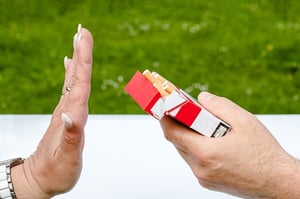When we think of air pollution, the images of smog-covered skylines and factory chimneys spewing...
10 Ways to Naturally Boost Your Energy
Do you feel your energy level is not where you want it to be? Fatigue, defined as “a feeling of weariness, tiredness, or lack of energy,” is not unusual as we age and may be linked to overexertion, stress, boredom, or lack of sleep. It can also indicate a deeper mental or physical problem. If the feeling persists, make an appointment with your medical provider.
Once more serious conditions have been ruled out, it's time to consider methods to boost your energy. Here are ten ways to get that zip back into your step.
Boost Your Energy Levels Naturally with These 10 Tips!
-
Bust That Stress
Do you feel overwhelmed and stressed with everything you have on your plate? Rather than suffer in silence, reach out to trusted confidants or a support group to discuss your feelings. Many find the assistance of a psychotherapist helpful in overcoming stress. There are numerous relaxation therapies available to manage stress levels as well. Some of the most prominent include meditation, Tai chi, yoga, and hypnosis.
-
Prioritize Regular Workouts
 While some view exercise as a mild form of self-torment, it is crucial to revving up your energy level. Exercise causes your body to burn calories and circulate oxygen more effectively, as well as increasing dopamine secretion, elevating mood. Aside from increasing your energy level, strength and endurance increase so that you can engage in a broader range of enjoyable activities.
While some view exercise as a mild form of self-torment, it is crucial to revving up your energy level. Exercise causes your body to burn calories and circulate oxygen more effectively, as well as increasing dopamine secretion, elevating mood. Aside from increasing your energy level, strength and endurance increase so that you can engage in a broader range of enjoyable activities.
Do you need some inspiration? Consider these articles to help get started!: -
Streamline the Schedule
Many times, stress-induced fatigue results from an overambitious schedule. When you get to this point, it's time to honestly assess all your commitments and set some priorities. Focus on the things most important to you and cut back on those not at the top of the list. You may feel some resistance to de-emphasizing some things or even dropping them. Yet, the significant benefit is that this will allow you some breathing room to relax and recharge your batteries.
-
Rest Up
Prioritizing sleep is a terrific way to elevate your energy levels. Most of us need 8-9 hours of sleep, yet significant sleep problems affect 14.5% of U.S. adults according to the CDC, and it is likely that many more experience some level of sleep problems, which lead to fatigue, stress, anxiety, and depression. Consult a medical professional if sleep problems seem to be diminishing your quality of life. Effective treatments exist for conditions like chronic pain, sleep apnea, restless leg syndrome, and other sleep disruptors. Otherwise, simple steps like establishing a regular bedtime/wake-up schedule, reducing caffeine intake, and minimizing daytime naps can help in falling asleep and staying asleep at night.
Learn more about sleep!
-
Say No to Smoking

Smoking saps energy by increasing carbon monoxide and reducing the amount of oxygen in the bloodstream. Also, blood vessels are narrowed, so the heart has to work harder to pump blood, thereby reducing a person’s energy. If kicking the habit alone has had limited results, many health providers offer effective smoking cessation programs.
-
Adopt a Healthy Diet
The old saying “you are what you eat” applies to low versus high energy levels. To boost energy, focus on nutrient-rich foods like whole grains, fruits, vegetables, lean proteins, and healthy fats. Avoid excessive processed foods, sugary drinks, and refined carbohydrates, which can lead to energy crashes.
-
Drink More Water

Dehydration is not only a problem for those stranded in the desert. Mild dehydration (1%-3% of body weight) has been shown to impact brain functions relating to mood, concentration, and working memory. It can also cause headaches, increased anxiety, and fatigue. How much water should you drink daily? One study recommended daily water consumption of at least 2.2 liters for women and 3.0 liters for men 50 and older.
Learn more by reading our post, Helpful Hydration Tips and 8 Reasons to Drink More Water.
-
Cut Back on Alcohol
While sometimes we feel energized by a drink or two, the aftermath typically is feelings of drowsiness and lethargy. Alcohol consumption close to bedtime may help us fall asleep faster. Yet, as it processes out of our system, the level of the stress hormone epinephrine increases, which can cause nighttime awakenings and a lack of daytime energy. Reducing or even eliminating alcohol can be a key component in boosting energy.
-
Caffeine in Moderation

Caffeine can effectively enhance your energy levels, but it’s easy to overdo it. The market is flooded with all manner of “energy” drinks that range in potency from 50-500 milligrams of caffeine per serving. For example, a typical 8-ounce cup of coffee has 95 mg of caffeine, while a 2-ounce 5-Hour Energy shot (extra strength) has 230 mg. The FDA recommends that adults limit their caffeine intake to 400 milligrams daily. Excessive caffeine can lead to problems such as increased heart rate, high blood pressure, sleep disruptions, and anxiety.
-
Find Meaningful Activities
Are you doing what you love? Feeling stuck in a rut with boring activities can easily sap your energy. Perhaps you should reassess how you spend your time. Maybe there are some commitments you cannot change at this point in your life. Nevertheless, taking even small steps can make you feel more energized. For example, take a community education class in a subject you like. Not only will you feel enthusiasm for the class content, but you may also make new friends who share your interests.
Life moves fast, and it’s easy to feel drained or unfocused by the end of the day. But small changes—whether it’s getting better sleep, moving your body more, or just taking a real break—can make a noticeable difference. Try a few of the ideas above and see what helps you feel more like yourself again. Sometimes a little shift is all it takes to get your energy back on track.
Let us know in the comments below - what is your favorite energy-boosting tip?



.jpg?width=600&name=iStock-1662676228%20(1).jpg)

.jpg?width=600&name=iStock-1637857697%20(1).jpg)
